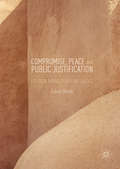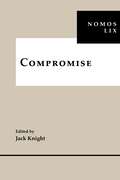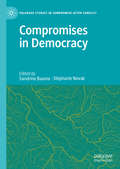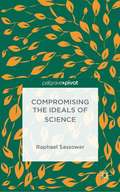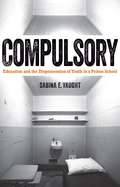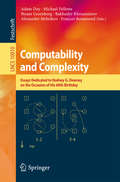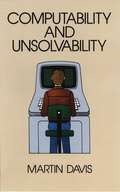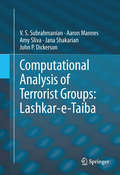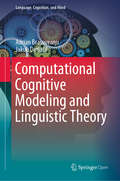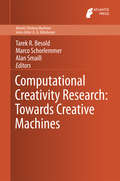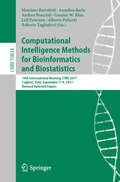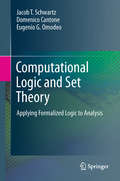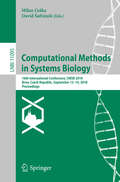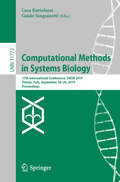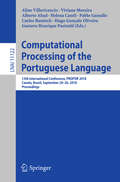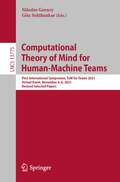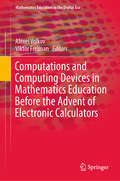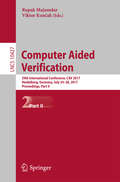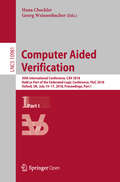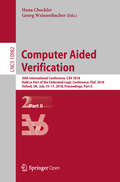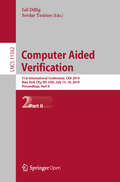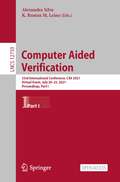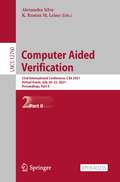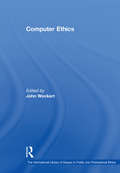- Table View
- List View
Compromise, Peace and Public Justification: Political Morality Beyond Justice
by Fabian WendtThis book explores the morality of compromising. The author argues that peace and public justification are values that provide moral reasons to make compromises in politics, including compromises that establish unjust laws or institutions. He explains how it is possible to have moral reasons to agree to moral compromises and he debates our moral duties and obligations in making such compromises. The book also contains discussions of the sources of the value of public justification, the relation between peace and justice, the nature of modus vivendi arrangements and the connections between compromise, liberal institutions and legitimacy. In exploring the morality of compromising, the book thus provides some outlines for a map of political morality beyond justice.
Compromise: NOMOS LIX (NOMOS - American Society for Political and Legal Philosophy #22)
by Jack KnightA distinguished group of scholars explores compromise in contemporary affairs Do lawmakers have a greater ethical responsibility to compromise than ordinary citizens? How does one rectify what is at stake when lawmakers concede to compromise for the sake of reaching resolution? Is compromise necessarily equalizing and is it a reasonable mode of problem solving and dispute resolution? In this latest installment from the NOMOS series, distinguished scholars across the fields of political science, law, and philosophy tackle the complex set of questions that relate to the practice of compromise and its implications for social and political life in modern societies. The volume, edited by Jack Knight, brings together a range of perspectives – in both disciplinary and substantive terms – on representation, political morality, disagreement, negotiation, and various forms of compromise. The ten essays reflect a variety of considerations across interdisciplinary lines, and provide a new and thought-provoking discussion of the policy, practice, and philosophy of compromise, covering a number of specific topics including alternative dispute resolution (ADR) and conscientious objection. Examining these issues and more, Compromise offers new and thought provoking insights into the pressing issue of the importance of compromise in social and political affairs.
Compromises in Democracy (Palgrave Studies in Compromise after Conflict)
by Stéphanie Novak Sandrine BaumeThis book provides an interdisciplinary examination of the relationship between compromise and democracy. Compromises have played a significant role in our representative democracies and yet the nature of the relationship between compromise and democracy has generally raised tricky theoretical questions and generated ambiguous evaluations. This book focuses on the relationship between compromise and liberal democracies from both a cultural and institutional perspective and addresses new and lesser-explored aspects of the relationship. It explores a variety of topics including: compromise and in-commensurable values, antagonist paradigms, compromise and majority decisions, compromise and publicity, compromise and post-conflict societies, compromise and anti-system political parties, and compromise and the understanding of political representation. Compromises in Democracy offers an original perspective on the topic by assembling contributions from the fields of philosophy, sociology, political theory, political science and history of ideas.
Compromising the Ideals of Science
by Raphael SassowerThis books examines the conditions under which scientists compromised the ideals of science, and elucidates these with reference to the challenges of profit motives and national security concerns. The book also offers suggestions for changing the political and economic conditions under which the integrity of science and its ethos can be practiced.
Compulsory: Education and the Dispossession of Youth in a Prison School
by Sabina E. Vaught&“This is an American story, unsettled by contradictions, constituted by unresolvable loss and open-ended hope, produced through brutal exclusivities and persistent insurgencies. This is the story of Lincoln prison.&” In her Introduction, Sabina E. Vaught passionately details why the subject of prisons and prison schooling is so important. An unprecedented institutional ethnography of race and gender power in one state&’s juvenile prison school system, Compulsory will have major implications for public education everywhere.Vaught argues that through its educational apparatus, the state disproportionately removes young Black men from their homes and subjects them to the abuses of captivity. She explores the various legal and ideological forces shaping juvenile prison and prison schooling, and examines how these forces are mechanized across multiple state apparatuses, not least school. Drawing richly on ethnographic data, she tells stories that map the repression of rightless, incarcerated youth, whose state captivity is the contemporary expression of age-old practices of child removal and counterinsurgency. Through a theoretically rigorous analysis of the daily experiences of prisoners, teachers, state officials, mothers, and more, Compulsory provides vital insight into the broad compulsory systems of schooling—both Inside prison and in the world Outside—asking readers to reconsider conventional understandings of the role, purpose, and value of state schooling today.
Computability and Complexity: Essays Dedicated to Rodney G. Downey on the Occasion of His 60th Birthday (Lecture Notes in Computer Science #10010)
by Adam Day, Michael Fellows, Noam Greenberg, Bakhadyr Khoussainov, Alexander Melnikov and Frances RosamondThis Festschrift is published in honor of Rodney G. Downey, eminent logician and computer scientist, surfer and Scottish country dancer, on the occasion of his 60th birthday.The Festschrift contains papers and laudations that showcase the broad and important scientific, leadership and mentoring contributions made by Rod during his distinguished career. The volume contains 42 papers presenting original unpublished research, or expository and survey results in Turing degrees, computably enumerable sets, computable algebra, computable model theory, algorithmic randomness, reverse mathematics, and parameterized complexity, all areas in which Rod Downey has had significant interests and influence. The volume contains several surveys that make the various areas accessible to non-specialists while also including some proofs that illustrate the flavor of the fields.
Computability and Logic
by John P. Burgess George S. Boolos Richard C. JeffreyThis fourth edition of one of the classic logic textbooks has been thoroughly revised by John Burgess. The aim is to increase the pedagogical value of the book for the core market of students of philosophy and for students of mathematics and computer science as well. This book has become a classic because of its accessibility to students without a mathematical background, and because it covers not simply the staple topics of an intermediate logic course such as Godel's Incompleteness Theorems, but also a large number of optional topics from Turing's theory of computability to Ramsey's theorem. John Burgess has now enhanced the book by adding a selection of problems at the end of each chapter, and by reorganising and rewriting chapters to make them more independent of each other and thus to increase the range of options available to instructors as to what to cover and what to defer.<P> Advisory: Bookshare has learned that this book offers only partial accessibility. We have kept it in the collection because it is useful for some of our members. To explore further access options with us, please contact us through the Book Quality link on the right sidebar. Benetech is actively working on projects to improve accessibility issues such as these.
Computability and Unsolvability
by Prof. Martin DavisIn this classic text, Dr. Davis provides a clear introduction to computability, at an advanced undergraduate level, that serves the needs of specialists and non-specialists alike.In Part One (Chapters 1–5), Professor Davis outlines the general theory of computability, discussing such topics as computable functions, operations on computable functions, recursive functions, Turing machines, self-applied, and unsolvable decision problems. The author has been careful, especially in the first seven chapters, to assume no special mathematical training on the part of the reader.Part Two (Chapters 6–8) comprises a concise treatment of applications of the general theory, incorporating material on combinatorial problems, Diophantine Equations (including Hilbert's Tenth Problem) and mathematical logic. The final three chapters (Part 3) present further development of the general theory, encompassing the Kleene hierarchy, computable functionals, and the classification of unsolvable decision problems.When first published in 1958, this work introduced much terminology that has since become standard in theoretical computer science. Indeed, the stature of the book is such that many computer scientists regard it as their theoretical introduction to the topic. This new Dover edition makes this pioneering, widely admired text available in an inexpensive format.For Dover's edition, Dr. Davis has provided a new Preface and an Appendix, "Hilbert's Tenth Problem Is Unsolvable," an important article he published in The American Mathematical Monthly in 1973, which was awarded prizes by the American Mathematical Society and the Mathematical Association of America. These additions further enhance the value and usefulness of an "unusually clear and stimulating exposition" (Centre National de la Recherche Scientifique, Paris) now available for the first time in paperback.
Computational Analysis of Terrorist Groups: Lashkar-e-taiba
by Amy Sliva V. S. Subrahmanian John P. Dickerson Jana Shakarian Aaron MannesComputational Analysis of Terrorist Groups: Lashkar-e-Taiba provides an in-depth look at Web intelligence, and how advanced mathematics and modern computing technology can influence the insights we have on terrorist groups. This book primarily focuses on one famous terrorist group known as Lashkar-e-Taiba (or LeT), and how it operates. After 10 years of counter Al Qaeda operations, LeT is considered by many in the counter-terrorism community to be an even greater threat to the US and world peace than Al Qaeda. Computational Analysis of Terrorist Groups: Lashkar-e-Taiba is the first book that demonstrates how to use modern computational analysis techniques including methods for "big data" analysis. This book presents how to quantify both the environment in which LeT operate, and the actions it took over a 20-year period, and represent it as a relational database table. This table is then mined using sophisticated data mining algorithms in order to gain detailed, mathematical, computational and statistical insights into LeT and its operations. This book also provides a detailed history of Lashkar-e-Taiba based on extensive analysis conducted by using open source information and public statements. Each chapter includes a case study, as well as a slide describing the key results which are available on the authors' web sites. Computational Analysis of Terrorist Groups: Lashkar-e-Taiba is designed for a professional market composed of government or military workers, researchers and computer scientists working in the web intelligence field. Advanced-level students in computer science will also find this valuable as a reference book.
Computational Cognitive Modeling and Linguistic Theory (Language, Cognition, and Mind #6)
by Adrian Brasoveanu Jakub DotlačilThis open access book introduces a general framework that allows natural language researchers to enhance existing competence theories with fully specified performance and processing components. Gradually developing increasingly complex and cognitively realistic competence-performance models, it provides running code for these models and shows how to fit them to real-time experimental data. This computational cognitive modeling approach opens up exciting new directions for research in formal semantics, and linguistics more generally, and offers new ways of (re)connecting semantics and the broader field of cognitive science.The approach of this book is novel in more ways than one. Assuming the mental architecture and procedural modalities of Anderson’s ACT-R framework, it presents fine-grained computational models of human language processing tasks which make detailed quantitative predictions that can be checked against the results of self-paced reading and other psycho-linguistic experiments. All models are presented as computer programs that readers can run on their own computer and on inputs of their choice, thereby learning to design, program and run their own models. But even for readers who won't do all that, the book will show how such detailed, quantitatively predicting modeling of linguistic processes is possible. A methodological breakthrough and a must for anyone concerned about the future of linguistics! (Hans Kamp) This book constitutes a major step forward in linguistics and psycholinguistics. It constitutes a unique synthesis of several different research traditions: computational models of psycholinguistic processes, and formal models of semantics and discourse processing. The work also introduces a sophisticated python-based software environment for modeling linguistic processes. This book has the potential to revolutionize not only formal models of linguistics, but also models of language processing more generally. (Shravan Vasishth)
Computational Creativity Research: Towards Creative Machines (Atlantis Thinking Machines #7)
by Tarek R. Besold Marco Schorlemmer Alan SmaillComputational Creativity, Concept Invention, and General Intelligence in their own right all are flourishing research disciplines producing surprising and captivating results that continuously influence and change our view on where the limits of intelligent machines lie, each day pushing the boundaries a bit further. By 2014, all three fields also have left their marks on everyday life - machine-composed music has been performed in concert halls, automated theorem provers are accepted tools in enterprises' R&D departments, and cognitive architectures are being integrated in pilot assistance systems for next generation airplanes. Still, although the corresponding aims and goals are clearly similar (as are the common methods and approaches), the developments in each of these areas have happened mostly individually within the respective community and without closer relationships to the goings-on in the other two disciplines. In order to overcome this gap and to provide a common platform for interaction and exchange between the different directions, the International Workshops on "Computational Creativity, Concept Invention, and General Intelligence" (C3GI) have been started. At ECAI-2012 and IJCAI-2013, the first and second edition of C3GI each gathered researchers from all three fields, presenting recent developments and results from their research and in dialogue and joint debates bridging the disciplinary boundaries. The chapters contained in this book are based on expanded versions of accepted contributions to the workshops and additional selected contributions by renowned researchers in the relevant fields. Individually, they give an account of the state-of-the-art in their respective area, discussing both, theoretical approaches as well as implemented systems. When taken together and looked at from an integrative perspective, the book in its totality offers a starting point for a (re)integration of Computational Creativity, Concept Invention, and General Intelligence, making visible common lines of work and theoretical underpinnings, and pointing at chances and opportunities arising from the interplay of the three fields.
Computational Intelligence Methods for Bioinformatics and Biostatistics: 14th International Meeting, CIBB 2017, Cagliari, Italy, September 7-9, 2017, Revised Selected Papers (Lecture Notes in Computer Science #10834)
by Leif Peterson Roberto Tagliaferri Alberto Policriti Andrea Bracciali Massimo Bartoletti Annalisa Barla Gunnar W. KlauThis book constitutes the thoroughly refereed post-conference proceedings of the 14th International Meeting on Computational. Intelligence Methods for Bioinformatics and Biostatistics, CIBB 2017, held in Cagliari, Italy, in September 2017.The 19 revised full papers presented were carefully reviewed and selected from 44 submissions. The papers deal with the application of computational intelligence to open problems in bioinformatics, biostatistics, systems and synthetic biology, medical informatics, computational approaches to life sciences in general.
Computational Logic and Set Theory: Applying Formalized Logic to Analysis (Texts in Computer Science)
by Martin Davis Domenico Cantone Jacob T. Schwartz Eugenio G. OmodeoThis must-read text presents the pioneering work of the late Professor Jacob (Jack) T. Schwartz on computational logic and set theory and its application to proof verification techniques, culminating in the ÆtnaNova system, a prototype computer program designed to verify the correctness of mathematical proofs presented in the language of set theory. Topics and features: describes in depth how a specific first-order theory can be exploited to model and carry out reasoning in branches of computer science and mathematics; presents an unique system for automated proof verification in large-scale software systems; integrates important proof-engineering issues, reflecting the goals of large-scale verifiers; includes an appendix showing formalized proofs of ordinals, of various properties of the transitive closure operation, of finite and transfinite induction principles, and of Zorn's lemma.
Computational Methods in Systems Biology: 16th International Conference, CMSB 2018, Brno, Czech Republic, September 12-14, 2018, Proceedings (Lecture Notes in Computer Science #11095)
by David Šafránek Milan ČeškaThis book constitutes the refereed proceedings of the 16th International Conference on Computational Methods in Systems Biology, CMSB 2018, held in BRNO, Czech Republic, in September 2018. The 15 full and 7 short papers presented together with 5 invited talks were carefully reviewed and selected from 46 submissions. Topics of interest include formalisms for modeling biological processes; models and their biological applications; frameworks for model verification, validation, analysis, and simulation of biological systems; high-performance computational systems biology; parameter and model inference from experimental data; automated parameter and model synthesis; model integration and biological databases; multi-scale modeling and analysis methods; design, analysis, and verification methods for synthetic biology; methods for biomolecular computing and engineered molecular devices.Chapters 3, 9 and 10 are available open access under a Creative Commons Attribution 4.0 International License via link.springer.com.
Computational Methods in Systems Biology: 17th International Conference, CMSB 2019, Trieste, Italy, September 18–20, 2019, Proceedings (Lecture Notes in Computer Science #11773)
by Guido Sanguinetti Luca BortolussiThis book constitutes the refereed proceedings of the 17th International Conference on Computational Methods in Systems Biology, CMSB 2019, held in Trieste, Italy, in September 2019.The 14 full papers, 7 tool papers and 11 posters were carefully reviewed and selected from 53 submissions. Topics of interest include formalisms for modeling biological processes; models and their biological applications; frameworks for model verification, validation, analysis, and simulation of biological systems; high-performance computational systems biology and parallel implementations; model inference from experimental data; model integration from biological databases; multi-scale modeling and analysis methods; computational approaches for synthetic biology; and case studies in systems and synthetic biology.
Computational Processing of the Portuguese Language: 13th International Conference, PROPOR 2018, Canela, Brazil, September 24–26, 2018, Proceedings (Lecture Notes in Computer Science #11122)
by Carlos Ramisch Aline Villavicencio Alberto Abad Viviane Moreira Helena Caseli Pablo Gamallo Hugo Gonçalo Oliveira Gustavo Henrique PaetzoldThis book constitutes the refereed proceedings of the 13th International Conference on Computational Processing of the Portuguese Language, PROPOR 2018, held in Canela, RS, Brazil, in September 2018.The 42 full papers, 3 short papers and 4 other papers presented in this volume were carefully reviewed and selected from 92 submissions. The papers are organized in topical sections named: Corpus Linguistics, Information Extraction, LanguageApplications, Language Resources, Sentiment Analysis and Opinion Mining, Speech Processing, and Syntax and Parsing.
Computational Theory of Mind for Human-Machine Teams: First International Symposium, ToM for Teams 2021, Virtual Event, November 4–6, 2021, Revised Selected Papers (Lecture Notes in Computer Science #13775)
by Gita Sukthankar Nikolos GurneyThis book constitutes the proceedings of the First International Symposium, ToM for Teams 2021, held in Washington, DC, USA, during November 4–6, 2021, Each chapter in this section tackles a different aspect of AI representing the thoughts and beliefs of human agents. The work presented herein represents our collective efforts to better understand ToM, develop AI with ToM capabilities (ASI), and study how to integrate such systems into human teams.
Computations and Computing Devices in Mathematics Education Before the Advent of Electronic Calculators (Mathematics Education in the Digital Era #11)
by Viktor Freiman Alexei VolkovThis volume traces back the history of interaction between the “computational” or “algorithmic” aspects of elementary mathematics and mathematics education throughout ages. More specifically, the examples of mathematical practices analyzed by the historians of mathematics and mathematics education who authored the chapters in the present collection show that the development (and, in some cases, decline) of counting devices and related computational practices needs to be considered within a particular context to which they arguably belonged, namely, the context of mathematics instruction; in their contributions the authors also explore the role that the instruments played in formation of didactical approaches in various mathematical traditions, stretching from Ancient Mesopotamia to the 20th century Europe and North America.
Computer Aided Verification: 29th International Conference, CAV 2017, Heidelberg, Germany, July 24-28, 2017, Proceedings, Part II (Lecture Notes in Computer Science #10427)
by Rupak Majumdar Viktor KunčakThe two-volume set LNCS 10426 and LNCS 10427 constitutes the refereed proceedings of the 29th International Conference on Computer Aided Verification, CAV 2017, held in Heidelberg, Germany, in July 2017. The total of 50 full and 7 short papers presented together with 5 keynotes and tutorials in the proceedings was carefully reviewed and selected from 191 submissions. The CAV conference series is dedicated to the advancement of the theory and practice of computer-aided formal analysis of hardware and software systems. The conference covers the spectrum from theoretical results to concrete applications, with an emphasis on practical verification tools and the algorithms and techniques that are needed for their implementation.
Computer Aided Verification: 30th International Conference, CAV 2018, Held as Part of the Federated Logic Conference, FloC 2018, Oxford, UK, July 14-17, 2018, Proceedings, Part I (Lecture Notes in Computer Science #10981)
by Hana Chockler Georg WeissenbacherThis open access two-volume set LNCS 10980 and 10981 constitutes the refereed proceedings of the 30th International Conference on Computer Aided Verification, CAV 2018, held in Oxford, UK, in July 2018. The 52 full and 13 tool papers presented together with 3 invited papers and 2 tutorials were carefully reviewed and selected from 215 submissions. The papers cover a wide range of topics and techniques, from algorithmic and logical foundations of verification to practical applications in distributed, networked, cyber-physical, and autonomous systems. They are organized in topical sections on model checking, program analysis using polyhedra, synthesis, learning, runtime verification, hybrid and timed systems, tools, probabilistic systems, static analysis, theory and security, SAT, SMT and decisions procedures, concurrency, and CPS, hardware, industrial applications.
Computer Aided Verification: 30th International Conference, CAV 2018, Held as Part of the Federated Logic Conference, FloC 2018, Oxford, UK, July 14-17, 2018, Proceedings, Part II (Lecture Notes in Computer Science #10982)
by Hana Chockler Georg WeissenbacherThis open access two-volume set LNCS 10980 and 10981 constitutes the refereed proceedings of the 30th International Conference on Computer Aided Verification, CAV 2018, held in Oxford, UK, in July 2018. The 52 full and 13 tool papers presented together with 3 invited papers and 2 tutorials were carefully reviewed and selected from 215 submissions. The papers cover a wide range of topics and techniques, from algorithmic and logical foundations of verification to practical applications in distributed, networked, cyber-physical, and autonomous systems. They are organized in topical sections on model checking, program analysis using polyhedra, synthesis, learning, runtime verification, hybrid and timed systems, tools, probabilistic systems, static analysis, theory and security, SAT, SMT and decisions procedures, concurrency, and CPS, hardware, industrial applications.
Computer Aided Verification: 31st International Conference, CAV 2019, New York City, NY, USA, July 15-18, 2019, Proceedings, Part II (Lecture Notes in Computer Science #11562)
by Isil Dillig Serdar TasiranThe open access two-volume set LNCS 11561 and 11562 constitutes the refereed proceedings of the 31st International Conference on Computer Aided Verification, CAV 2019, held in New York City, USA, in July 2019. The 52 full papers presented together with 13 tool papers and 2 case studies, were carefully reviewed and selected from 258 submissions. The papers were organized in the following topical sections: Part I: automata and timed systems; security and hyperproperties; synthesis; model checking; cyber-physical systems and machine learning; probabilistic systems, runtime techniques; dynamical, hybrid, and reactive systems; Part II: logics, decision procedures; and solvers; numerical programs; verification; distributed systems and networks; verification and invariants; and concurrency.
Computer Aided Verification: 33rd International Conference, CAV 2021, Virtual Event, July 20–23, 2021, Proceedings, Part I (Lecture Notes in Computer Science #12759)
by K. Rustan M. Leino Alexandra SilvaThis open access two-volume set LNCS 12759 and 12760 constitutes the refereed proceedings of the 33rd International Conference on Computer Aided Verification, CAV 2021, held virtually in July 2021. The 63 full papers presented together with 16 tool papers and 5 invited papers were carefully reviewed and selected from 290 submissions. The papers were organized in the following topical sections: Part I: invited papers; AI verification; concurrency and blockchain; hybrid and cyber-physical systems; security; and synthesis. Part II: complexity and termination; decision procedures and solvers; hardware and model checking; logical foundations; and software verification.This is an open access book.
Computer Aided Verification: 33rd International Conference, CAV 2021, Virtual Event, July 20–23, 2021, Proceedings, Part II (Lecture Notes in Computer Science #12760)
by K. Rustan M. Leino Alexandra SilvaThis open access two-volume set LNCS 12759 and 12760 constitutes the refereed proceedings of the 33rd International Conference on Computer Aided Verification, CAV 2021, held virtually in July 2021.The 63 full papers presented together with 16 tool papers and 5 invited papers were carefully reviewed and selected from 290 submissions. The papers were organized in the following topical sections: Part I: invited papers; AI verification; concurrency and blockchain; hybrid and cyber-physical systems; security; and synthesis. Part II: complexity and termination; decision procedures and solvers; hardware and model checking; logical foundations; and software verification.
Computer Ethics (The International Library of Essays in Public and Professional Ethics #No. 4.)
by John WeckertThe study of the ethical issues related to computer use developed primarily in the 1980s, although a number of important papers were published in previous decades, many of which are contained in this volume. Computer ethics, as the field became known, flourished in the following decades. The emphasis initially was more on the computing profession: on questions related to the development of systems, the behaviour of computing professionals and so on. Later the focus moved to the Internet and to users of computer and related communication technologies. This book reflects these different emphases and has articles on most of the important issues, organised into sections on the history and nature of computer ethics, cyberspace, values and technology, responsibility and professionalism, privacy and surveillance, what computers should not do and morality and machines.
